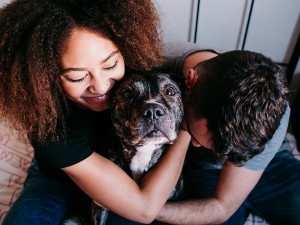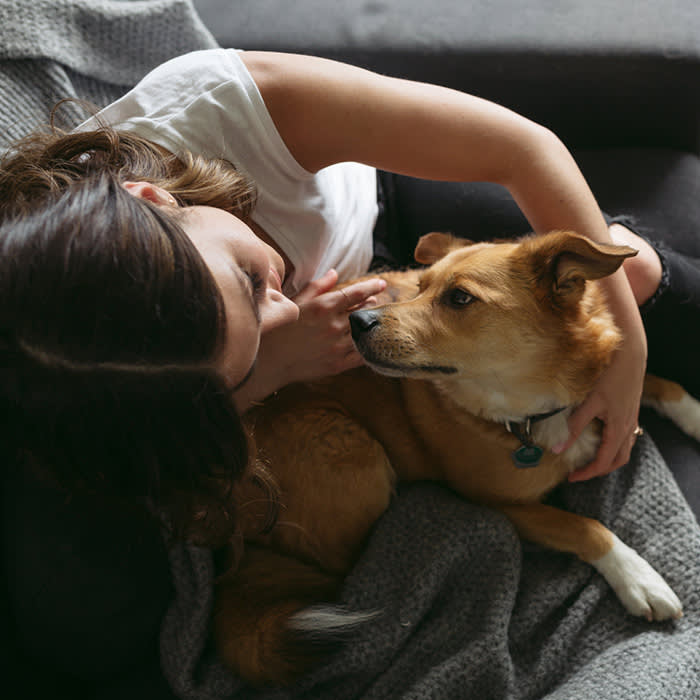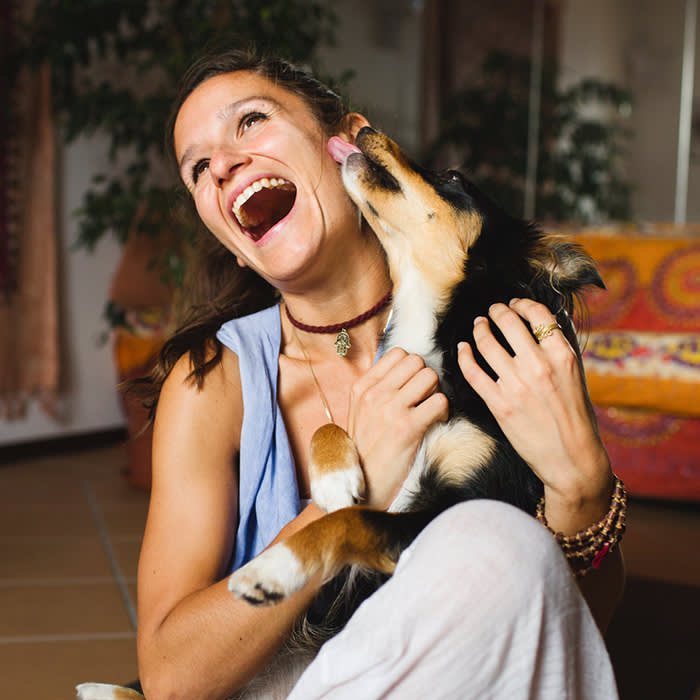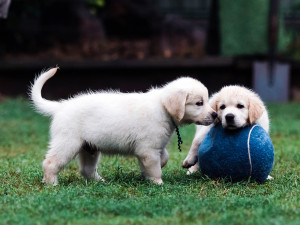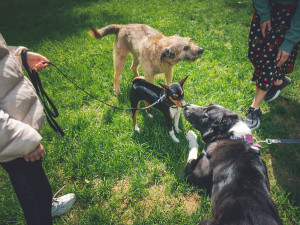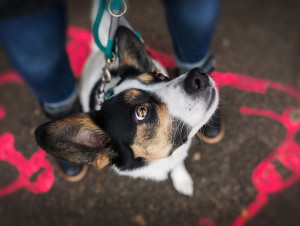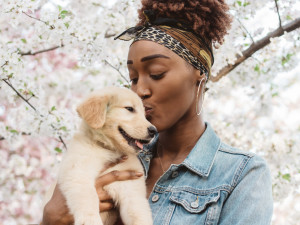How to Know if Your Dog Has Imprinted on You
If they’re following you around like your shadow, there’s a reason for that.
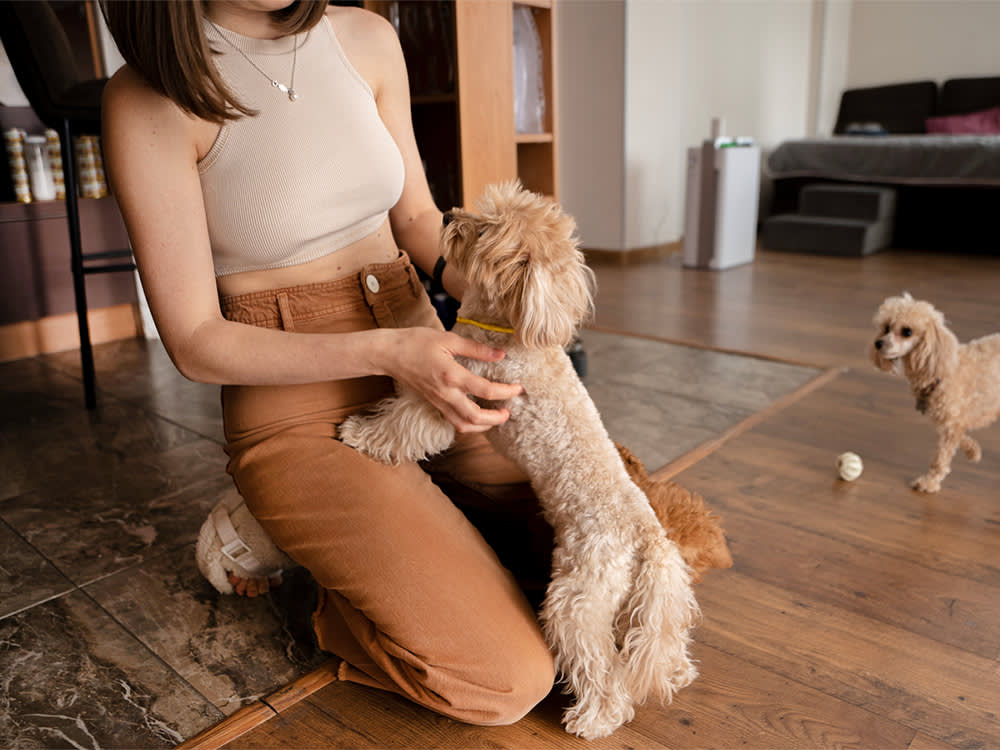
Share Article
In This Article:
What Does It Mean When a Dog Imprints? 1 0 Signs Your Dog Has Imprinted on You Can Dogs Imprint on Humans? Can Your Dog Be Too Attached to You? The Three Stages of Puppy Imprinting At What Age Do Dogs Stop Imprinting? Common Dog Imprinting Behaviors How to Bond With Your Dog
Does your dog only have eyes for you? Do they look to you for guidance more than they do other members of the family? This may be a sign that your dog has imprinted on you, making you their most trusted human.
Read on to learn how to know if a dog has imprinted on you and what exactly that means, as well as how to strengthen the bond with your dog.
What does it mean when a dog imprints?
Imprinting, or bondingopens in new tab, occurs when a dog develops a trusting, dependent, and close attachment to a human or other animal. It often happens at a young age, but can occur at various stages in life. Rather than love at first sight, it’s a process that takes time. Imprinting can lead to a strong attachment, which may have both positive and potentially distressing aspects to it.
10 signs your dog has imprinted on you
You may have a feeling that your dog has put you on a pedestal. But if you want to know for sure that your dog loves you, here are 10 things your dog may do after imprinting on you.
Follow you around.
Mirroring your behaviors.
Follow your commands more than others’ commands.
Check in.
Seek out companionship and affection.
Maintain eye contact.
Snuggle your belongings.
Read your emotions.
Take care of you.
Know your schedule.
Can dogs imprint on humans?
You’ve likely heard of geese or ducks imprinting on humans. That’s because precocial species, like many birds, cows, and horses, tend to imprint on the first thing they see after hatching or being born. They rely on this person or animal to keep them safe and teach them the ways of the world.
Dogs are a little bit different in that they are altricial, meaning that they are born needing a little time before they’re ready to get up and get going. Rather than imprint on the first thing they see, they tend to learn about their environment from their mother, littermates, and any humans or other animals that are around. As they continue to develop, they can form strong bonds with those closest to them, not just the ones they saw first after birth.
How long does it take a dog to imprint on a human?
Each dog is different, and so is the time that it takes them to imprint on a human. Some dogs are quick to trust and devote themselves to their one and only, while others take a little bit of time. The age of the dog as well as any negative past experiences can play large roles.
Can dogs imprint on more than one person?
Dogs who are part of a family can form strong bonds with more than one person. However, they still tend to pick favorites, slightly preferring one person more than others.
Can your dog be too attached to you?
It feels good to be your pup’s numero uno. But is there a potential downside to this attachment thing? There is such a thing as becoming too attached. The main concern about this is separation anxiety. Some dogs can be so into their chosen humans that they actually become anxious when they’re not with them. Separation anxiety can become a serious issue with dogs becoming destructive to themselves or to your things.
If you have concerns about separation anxiety — or other signs that your dog struggles when you’re not around to show them the ropes — check in with your veterinarian or a veterinary behaviorist for advice on managing their behavior.
Another potential downside is poor behavior towards other family members. While you may be able to get your dog to go potty on a leash or use their manners at dinnertime, they may not be so helpful when another person asks the same thing of them. This can create negative experiences with other people who aren’t as closely attached to your dog as you are.
The three stages of puppy imprinting
1. Canine imprinting
This stage begins when a puppy first opens their eyes and can last until they are seven months old. The most critical period is from three to 12 weeks of age, when a puppy is learning and observing other dogs, especially their mother and litter mates. They start to understand dog-to-dog social skills such as bite inhibition and canine social signaling, with learning about their environment coming in the latter part of this stage.
2. Human imprinting
This stage usually happens when puppies are between seven and 12 weeks old and is when puppies start to learn that there is a much bigger world beyond their littermates and mothers. Positive human interactions play a big role in how they will connect with people in the future. This is typically when we think of a puppy imprinting on a human.
3. Fear imprinting
This is when puppies are most likely to develop intense fears of even seemingly minor factors. Make sure you keep training and the rest of their environment positive, because this is when your pup could become scared or anxious, caused by specific triggers. Fear periods usually happen between eight and 11 weeks, as well as six to 14 months of age.
At what age do dogs stop imprinting?
The early socialization periods when your puppy is ripe for imprinting typically wrap up by about four months of age. But what if you get your dog later in life, when they’re past this initial rapid learning phase? Not to worry: Dogs can be very forgiving, so strong social bonds and other learning can occur after the initial socialization period. However, patience is key as it may take a little more time and encouragement for older dogs to imprint on humans.
Common dog imprinting behaviors explained
If your dog has imprinted on you, you will notice that they will act quite attached to you. You might not be able to go far without them following you (hello, bathroom trip for two?), and they might experience separation anxiety or other anxious behaviors when you are not with them.
Why does my dog follow me everywhere?
If you have a little shadow, this likely means your dog trusts and loves you deeply. You make them feel safe and cared for. It might be annoying that they are trailing you just about everywhere you go — but you’re their person, and that has to feel good.
Why does my dog mirror me?
A study published in 2017 by researchers in Austriaopens in new tab found that dogs are sensitive to their parents’ emotional states. They can pick up those feelings over time and begin to mirror their humans’ behavior.
Why does my dog listen to me but not others?
If you are the only one who has practiced training with your dog, you will likely be the only person your dog listens to. This is why it’s important for all family members — if you do not live alone — to participate in training, so there is consistency in your dog’s behavior. Otherwise, your dog may learn to only respect your commands and not others’ commands.
Why is my dog always “checking in” with me?
If your dog is constantly checking in with you, they are probably emotionally attached to you. They feel safe and secure when they are near you and know where you are. Some dogs even like to stay in physical contact with you, leaning on you to show their support and admiration.
Why does my dog always want to be near me?
Your dog wants to be near you because you provide comfort and safety to them. It could also be that they are trying to communicate something to you. They may be hungry or want to go for a walk.
Why does my dog look me in the eye?
Your dog stares soulfully into your eyes because they love you. In fact, staring into each other’s eyes releases oxytocin (aka the love hormone) in both humans and dogs, making both of you feel good.
Why does my dog enjoy laying in my laundry and is always in my stuff?
The number one reason is because your laundry and stuff smell like you. It’s comforting and makes them feel safe to be surrounded by your scent. This is another sign that they want to be close to you.
How does my dog know when I’m upset and need attention?
Dogs are pretty amazing creatures — they can use all of their senses to understand how we’re feeling. Research shows they can recognize humans’ emotions in our facial expressions. Because your dog can sense your emotions, they can probably pick up on cues when you are craving their attention.
Why does my dog lick me?
Dogs lick their humans for many different reasons. This is a way of grooming you and expressing their love, but it’s also how they might get your attention or soothe themselves if they are feeling stressed. Or maybe you just worked out, and your salty, sweaty skin tastes good to them (probably not the post-workout routine you were looking for). Your dog might also lick you to get you to stop doing something they are not enjoying. It’s always important to pay attention to their other body language, too.
Why does my dog sleep by my feet?
Remember that bit about how dogs feel safer with a certain person in their family? If your pup is snoozing at your feet, or sitting on you, this means they feel secure with you. You mean safety and comfort to them.
Why does my dog get excited when I come home?
Your dog is excited by your presence, and you make them happy. So, when you come home after being gone (even if you were just running to the grocery store for five minutes), they are overwhelmed by the fact that you’re back with them.
Want a better relationship with your pup? Here’s how to bond with your dog
Being a dog parent means more than just providing your pup with food, water, and shelter. Bonding with your dog comes down to spending quality time with them. This means exercising, playing, and training them.
Exercise
Take them for walks where they feel safe and secure, and also have a little fun. Dogs need daily exercise for their physical and mental health. Keep it fun by switching up the route or routine.
Play
Play games that stimulate their mind and associate you with good times. Interactive games like tug-of-war or fetch are great options because they require close interaction with you. Of course, playing can also mean a quiet petting session. It doesn’t always have to involve activity.
Train
Most dogs love to learn things, so teaching them obedience commands and tricks is a great way to help them see that you make a great companion. Always use positive reinforcementopens in new tab when training, and never punish your dog. Punishing them can create fear and anxiety, which you don’t want associated with you.
Bottom line
Imprinting in dogs occurs when a pup forms a strong bond or attachment to a human.
Most puppies will imprint on their chosen humans during their early developmental phases, between seven and 12 weeks of age, but older dogs can still form a strong bond with people.
If you want to strengthen your bond with your pup, make sure their needs are met and spend quality time with them.
FAQs
How do dogs choose their favorite person?
A puppy might imprint on the person who is providing them with the most care during their early development. That person offers them security and is someone they trust. Older dogs will often choose the person who spends the most time with them.
Can dogs change their favorite person?
Depending on life circumstances and how much time a person spends with a dog, a pup’s bond with them can strengthen. For example, your partner may be your dog’s go-to person because they worked from home and cared for the dog more. But if you now work from home, too, this extra time with your dog can help strengthen the relationship between the two of you.
Do dogs bond when they sleep with you?
Although many trainers (and allergists) might not recommend that you let your dog sleep in your bed, experts now suggest that sleeping with your dog can increase the bond with your pup. “I love that we’re reversing the question,” Dr. Dana Varble, chief veterinary officer for the North American Veterinary Community, told CNN in 2021opens in new tab. “In general, it is a very good thing for animals to sleep with their people.” She added: “Dogs and cats who are more closely bonded with their humans get additional health benefits, including increases in beneficial neurotransmitters such as oxytocin and dopamine, the feel-good hormones.”
What is a velcro dog?
The term “velcro dog” is used to describe a dog who stays close to you and doesn’t want to leave your side. This behavior may also be described as clingy. But the latter has negative connotations — a dog who sticks to you like velcro is really just comforted by your presence.
References
Albuquerque, Natalia and Briseida Resende. “Dogs functionally respond to and use emotional information from human expressions.” Evolutionary Human Sciences. 6 Dec 2022. https://pmc.ncbi.nlm.nih.gov/articles/PMC10426098/opens in new tab.
“Dogs Imprinting on Humans: What You Need to Know.” Ridgeside K9. https://ridgesidek9nc.com/dog-tips/dogs-imprinting-on-humans/opens in new tab.
“Positive Reinforcement Training.” The Humane Society of the United States. https://www.humanesociety.org/resources/positive-reinforcement-trainingopens in new tab.

Dr. Chyrle Bonk, DVM
Dr. Chyrle Bonk has been a mixed animal veterinarian since 2010, with a special interest in rehabilitation. Her work has been published by Senior Tail Waggers, Catster, and Dogster. When she's not practicing or writing about veterinary medicine, you may find her exploring the outdoors with her family or tending to her cows, horses, chickens, or cats and dogs.

Kate Sheofsky
Kate Sheofsky hails from San Francisco, where she developed a love of writing, Giants baseball, and houses she can’t afford. She currently lives in Portland, OR, and works as a freelance writer and content strategist. When not typing away on her laptop, she enjoys tooling around the city with her two rescue pups searching for tasty food and sunny patios.
Related articles
![Two Golden Retriever puppies playing with a large blue tennis ball outside in the grass]()
What to Expect at Puppy Socialization Classes
A dog behaviorist schools us on why puppy classes are more about socializing than getting straight As.
![Three dogs on leashes meeting and sniffing each other on a walk on the summer grass with owners]()
How Do I Get My Shy Dog To Socialize?
Kinship Collective dog trainer Robert Haussmann’s tips for getting a shy pup to go from wallflower to social butterfly.
![Couple hugs their merle Boxer]()
How to Improve Your Relationship with Your Dog
Animal behaviorist Dr. Karen B. London on how to strengthen your pet-parent bond.
![Dog on leash sitting on a colorful street and looking attentive at their pet parent]()
How to Get Your Dog to Pay Attention to You
Here are some simple steps to pry your pup away from that one spot in the yard they’re obsessed with.
![woman draped in an orange blanket holds a black-and-white puppy]()
5 Development Stages You Should Know When You Get a Puppy
It’s like What to Expect When You’re Expecting, except add “four little paws to run around your house” to the title.

